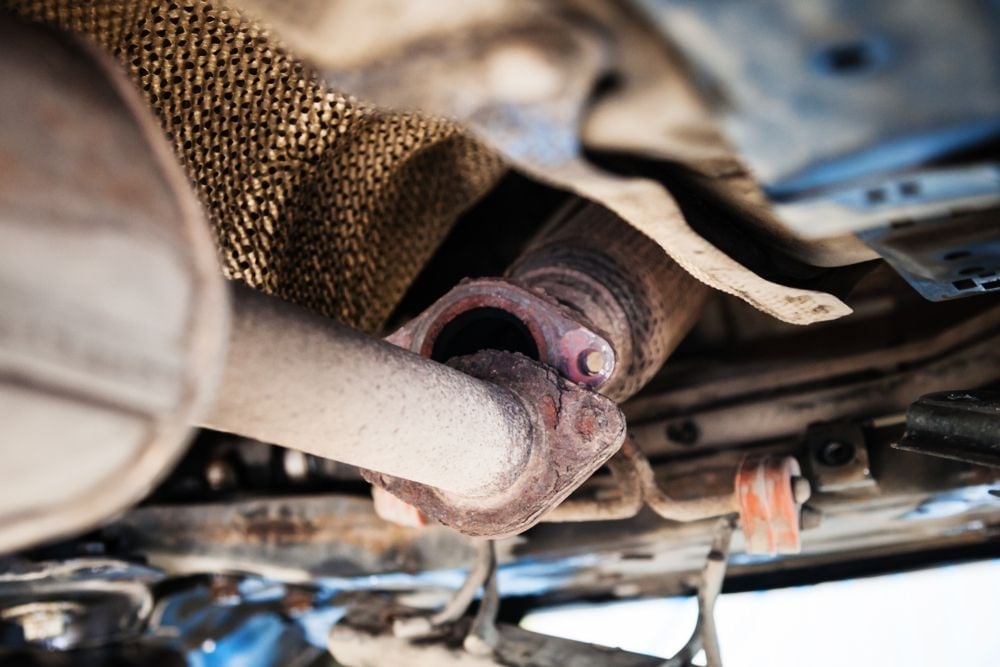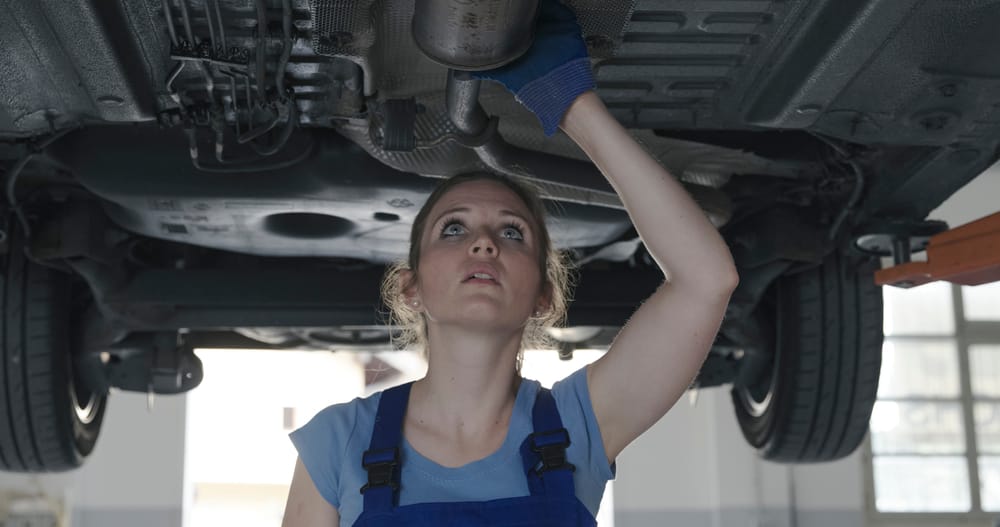
An exhaust system is designed to keep your car quiet. It is also
responsible for safely transporting the toxic fumes from the engine out the
rear of the vehicle.
Yet sometimes, it can develop leaks. Is it safe to drive the vehicle this
way? How long can you drive with an exhaust leak?
How long you drive with an exhaust leak depends upon where the leak has
developed. For example, if your engine manifold is leaking, driving can
introduce exhaust fumes into the car's cabin, so you should not drive
it at all. But if you have a leaky muffler, you can drive as long as
you like, but it will be a noisy ride, and you risk being pulled over
by the police.
An exhaust system typically consists of three parts — the exhaust manifold,
the downpipe, and the main silencer or muffler, all of which can develop
leaks.
Let's look at an exhaust system leak's seriousness and what happens if you
don't have it repaired.
 A broken exhaust bracket leading to an exhaust leak.
A broken exhaust bracket leading to an exhaust leak.
How Serious Is An Exhaust Leak?
An exhaust leak can let poisonous gases, like carbon monoxide, into the
passenger cabin, reduce fuel efficiency, foul oxygen sensors, and cause
catalytic converter failure and internal engine damage. Besides, it
also makes your car noisy.
An exhaust leak makes your car loud regardless of which part of the exhaust
system it has developed.
Besides being embarrassing, the situation can be hazardous.
The exhaust plumbing carries fumes and combustion byproducts away from the
engine.
If a leak develops, it can allow harmful substances into the vehicle's cab.
Introduce Toxic Fumes Into The Cabin
The passenger cabin of a car is not hermetically sealed. Instead, it relies
on the exhaust system to safely expel the exhaust gases from the car's
rear.
If the exhaust manifold leaks, these harmful gases find their way into the
vehicle's cabin instead of making their way outside.
The silent killer carbon monoxide is also a combustion byproduct. You won't
even know it leaks into your cabin until the worst happens.
Decrease Fuel Efficiency
Exhaust leaks can throw off the air-fuel ratio balance. This dupes the
oxygen sensors to think that the combustion mixture is lean, drawing more
fuel into the combustion chamber to compensate.
This significantly lowers your car's fuel efficiency, leading you to refuel
more often than usual.
Cause Catalytic Converter Failure
You have already read about the extra fuel being drawn into the combustion
chamber. But since the actual amount of air present is not enough to burn
all the fuel, the unburnt fuel is pushed towards the exhaust stream.
This fuel is not as insignificant as you think.
It travels to the catalytic converter, which operates at extremely high
temperatures. Upon entering this part, the fuel combusts, damaging its
interior substrate and clogging it, so it does not function correctly.
Destroy The Oxygen Sensors
The unburnt fuel is also responsible for destroying the oxygen sensors of
your engine. It can coat the tips of these sensors, preventing them from
taking a correct reading.
Besides lowering your fuel efficiency, a poorly performing oxygen sensor
can sap power from your engine and make your car idle poorly.
If you ignore the issue for too long, you might need to replace your oxygen sensors, which may be indicated to you by a check engine light.
Sabotage Internal Engine
This is the most serious impact of an exhaust leak. If your car develops
one in the wrong place, say by the exhaust manifold, it can lead to a
painfully expensive engine repair.
A leak close to the exhaust manifold prevents it from taking away the
extreme heat from combustion.
When it stays there, this heat can damage the engine valves that let the
exhaust fumes out of the engine.
Repairing such damage costs thousands of dollars, which you won't be keen on
spending. That's why you should not ignore a much cheaper exhaust leak and get it fixed as soon as possible.
 A mechanic looking for an exhaust leak.
A mechanic looking for an exhaust leak.
What Are Signs Of An Exhaust Leak?
Unusual engine sounds, vibrating gas pedal, loud noises while
accelerating, bad fuel efficiency, and strange smells are common signs
of an exhaust leak.
Let's go over each sign of an exhaust leak in more detail.
Unusual Engine Sounds
When you ignite the engine, and it emits a noise that keeps getting louder,
it is an unmistakable sign of a leak in the exhaust manifold gasket.
The gasket sits between the engine block and the piping from the exhaust
manifold. Along with piping, the gasket gets heated and cooled, which can
cause corrosion and leaks.
Vibrating Gas Pedal
Vibration is another sign of a leaky exhaust. You can tell your exhaust has
developed a leak when your gas pedal vibrates every time you step on it.
If the leak is small, the vibrations will be low, but as it increases in
size, so will the vibrations, extending to the steering column and
floorboards to the point where the whole cabin appears to be vibrating.
Loud Noises While Accelerating
A roaring sound is completely natural whenever you accelerate. But your
exhaust might be leaking if you hear sounds that seem like whistling or air
leaking. However, you should not rely on this symptom alone. Use it only
when you have already witnessed another symptom.
Strange Smells
Carbon monoxide may be odorless, but it is not the only fume that the
exhaust system expels.
If your exhaust system leaks, you might notice a strange burning smell
inside the cabin.
This can happen when the exhaust manifold becomes damaged. Since it is
responsible for gathering and sending the combustion byproducts away, if it
starts leaking, the exhaust fumes and gases will find their way back to the
engine or cabin, making it smell.
Conclusion
Driving with a leaky exhaust can harm your and your car's health. Even if you notice just one symptom of an exhaust leak, you should take it as a warning, get your vehicle to a mechanic, and have your exhaust system fixed inexpensively; otherwise, you could damage the engine, which is very expensive to repair or replace.